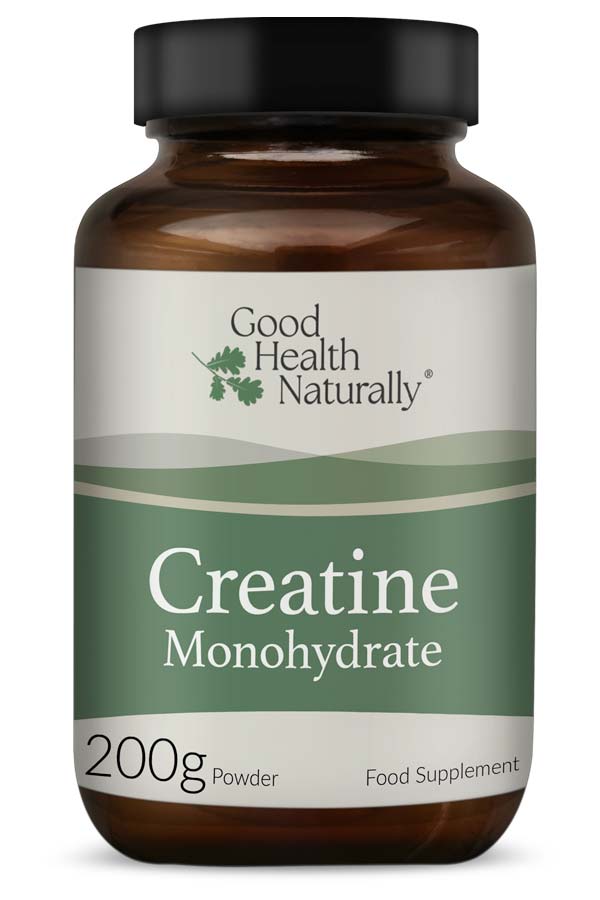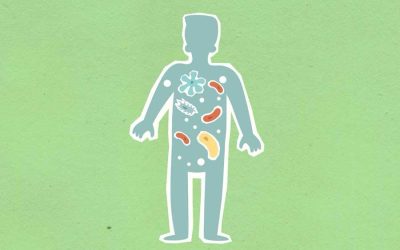One of the most trusted supplements for boosting strength, endurance and muscle recovery, creatine is a favourite among athletes and fitness enthusiasts. But the benefits of creatine don’t stop in the gym. Research shows that creatine also supports brain health, women’s wellness, and healthy ageing. That makes creatine a smart choice not just for athletes, but for anyone dealing with stress, ageing or demanding daily routines.
What Is Creatine and How Does It Work?
 Creatine is a naturally occurring compound found in foods like meat and fish, and it’s also produced in the body from amino acids glycine, arginine, and methionine. Most creatine is stored in muscles as phosphocreatine until needed to support ATP production, the primary energy source for cells.
Creatine is a naturally occurring compound found in foods like meat and fish, and it’s also produced in the body from amino acids glycine, arginine, and methionine. Most creatine is stored in muscles as phosphocreatine until needed to support ATP production, the primary energy source for cells.
How Creatine Supports ATP Production
By increasing phosphocreatine stores in muscles, creatine helps regenerate ATP more quickly, providing muscles and other energy-demanding tissues with the fuel they need during high-intensity activity.
Benefits of Creatine for Muscle Strength, Recovery & Performance
One of the main reasons athletes use creatine is to improve strength and performance.
Boosting Muscle Energy
During anaerobic exercise, such as sprinting or weightlifting, ATP is rapidly depleted. Creatine helps replenish ATP quickly, supporting peak performance.
Supporting Recovery and Reducing Muscle Breakdown
Creatine pulls water into muscle cells (cell volumisation), activating pathways that boost protein building, reduce muscle breakdown, and increase glycogen energy stores. Some research also suggests it may help prevent cramps and injuries.
Benefits of Creatine for Focus, Memory & Mental Energy
The brain is one of the body’s most energy-demanding organs, so it makes sense that creatine may help with mental performance.
Reducing Mental Fatigue
Research shows that supplementing with creatine can improve focus, memory, and clarity, particularly in situations of stress, sleep deprivation, or an ageing brain.
One study found that people who took creatine daily for five days felt less mental fatigue during repeated maths tasks. Brain measurements showed they used oxygen more efficiently after taking creatine.
Unique Benefits for Women
Interestingly, creatine may offer unique benefits for women. Studies show they tend to experience stress differently from men, often multitasking or dealing with disrupted sleep due to factors like caring for small children or menopause. Research suggests that the benefits of creatine for women extend beyond physical performance, supporting mental clarity, resilience, and overall cognitive function in these situations.
Supplementing with creatine offers powerful brain support, especially valuable in times of stress, sleep deprivation or ageing when mental energy is often drained.
Benefits of Creatine for Women’s Hormones, Energy & Bone Health
As oestrogen levels decline during menopause, women become more vulnerable to muscle loss and bone weakening. Creatine, particularly when combined with resistance training, has shown promise in slowing these changes.
Bone Health and Strength
A 12-month study involving postmenopausal women who did resistance training and took supplemental creatine daily experienced several key benefits. They saw a slower loss of bone mineral density, particularly in the hip, and an increase in femoral shaft width, which improves bone strength. These women also gained greater upper-body strength compared to those who didn’t take creatine.
Creatine may support bone health in two different ways. Indirectly, it boosts muscle energy and strength, which increases stress on bones during exercise and promotes bone growth. Directly, creatine may also act on bone cells themselves. In lab studies, it was shown to increase the activity of bone-forming cells, osteoblasts and reduce bone breakdown by limiting osteoclast activity. Together, these effects may help maintain stronger bones with age.
For women managing hormonal changes, creatine can be a key supplement for energy, bone strength and long-term health.
Benefits of Creatine for Weight Management & Healthy Ageing
As we age, metabolism slows and body fat often increases, raising the risk of issues like heart disease and type 2 diabetes.
Supporting Lean Muscle Growth
Creatine, especially when combined with regular exercise, helps combat these changes by supporting lean muscle growth, which naturally burns more calories at rest.
Metabolism and Blood Sugar Regulation
Building muscle also improves the body’s ability to store glucose, allowing sugar to be cleared from the bloodstream more efficiently. This helps prevent spikes in blood sugar and insulin levels.
While research is still exploring creatine’s direct effects on fat loss, early evidence suggests it can help the body use fat more effectively for energy. While not a direct fat-burner, creatine is a powerful tool for improving body composition, boosting metabolism, and supporting healthy ageing.
Hydration and Creatine: Supporting Maximum Benefits
Creatine works by pulling water into muscle cells, which helps support ATP production and muscle recovery. Proper hydration is essential when taking creatine, as inadequate fluid intake can reduce its effectiveness and may cause temporary bloating. To maximise the benefits of creatine, a simple guideline is to drink an additional glass of water for every gram of creatine consumed daily.
Creatine Safety, Risks & Best Practices
Creatine is considered safe for most people when used as directed. Creatine supplements, particularly creatine monohydrate, are among the most studied in sports nutrition and have a strong safety profile.
However, people with kidney disease or other pre-existing health conditions should consult a healthcare provider before starting supplementation.
By following recommended doses and staying hydrated, creatine can be a safe and effective way to boost both physical and mental performance.
Creatine Monohydrate vs Other Forms: What’s Best?
Choosing creatine in the monohydrate form is recommended because it is the most researched, effective, and safe type of creatine. Creatine monohydrate is highly bioavailable, meaning your body absorbs it well, allowing for better energy production in muscles during high-intensity exercise. It has been proven to increase strength, endurance, energy, and recovery, making it a reliable choice compared to other forms of creatine, which lack the same level of scientific support.
Who Can Benefit Most from Creatine
Creatine isn’t just for athletes — research shows it can support a wide range of individuals across various life stages and lifestyles. Some of the groups who may see the most significant benefits of creatine include:
- Vegetarians and vegans who get little to no creatine from their diet
- Older adults looking to maintain strength and cognitive function
- Women, especially during menopause or high-stress periods, who may notice improvements in energy and vitality
- Athletes and active individuals seeking better performance, recovery, and strength
- Anyone under chronic stress who could benefit from brain and energy support
The Bottom Line: Key Benefits of Creatine
Creatine monohydrate is one of the most researched and effective supplements available. From enhancing exercise performance and muscle recovery to supporting brain health, metabolism, and overall energy, creatine truly is a metabolic multitasker. Whether you are an athlete, a woman experiencing hormonal changes, an older adult, or someone seeking to enhance focus and vitality, the wide range of benefits of creatine demonstrates that this nutrient extends far beyond the gym.
References:
https://thepauselife.com/blogs/the-pause-blog/creatine-benefits-in-menopause?srsltid=AfmBOoquS5vsnWMg60HYmdYDv0GxwgXUsGY3nCdvNL10p5cDttONqRSH
https://www.ncbi.nlm.nih.gov/pmc/articles/PMC7998865/
https://pubmed.ncbi.nlm.nih.gov/21394604/
https://pubmed.ncbi.nlm.nih.gov/33578876/
https://www.ncbi.nlm.nih.gov/pmc/articles/PMC1691485/
https://pubmed.ncbi.nlm.nih.gov/26457568/
https://pubmed.ncbi.nlm.nih.gov/26907087/
https://pubmed.ncbi.nlm.nih.gov/22864465/
https://pubmed.ncbi.nlm.nih.gov/12850248/
https://pubmed.ncbi.nlm.nih.gov/32670557/
https://pubmed.ncbi.nlm.nih.gov/12439290/
https://pubmed.ncbi.nlm.nih.gov/11985880/
https://karger.com/anm/article/78/3/183/821423/A-High-Dose-of-Creatine-Combined-with-Resistance




